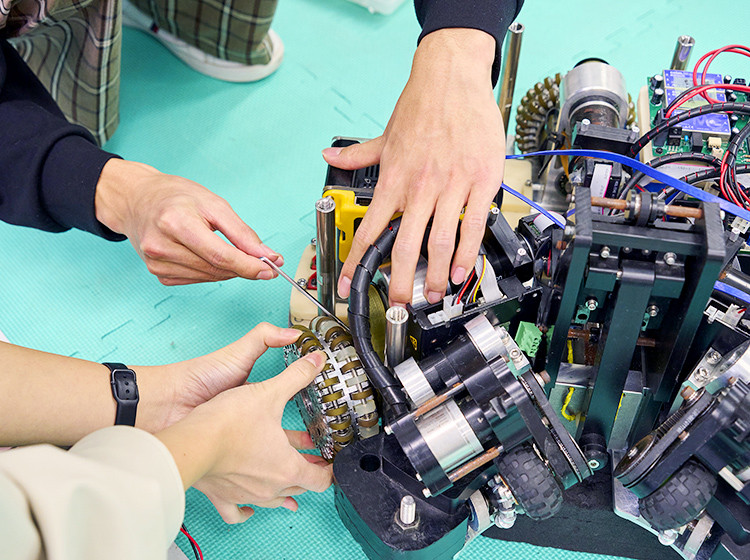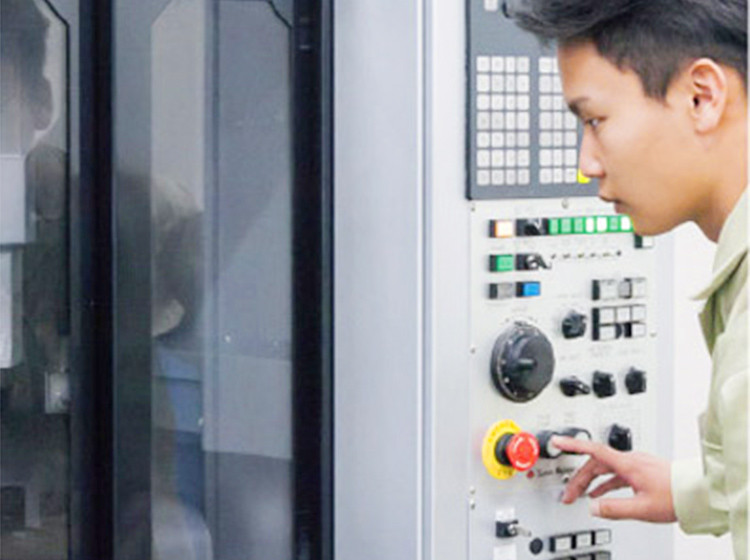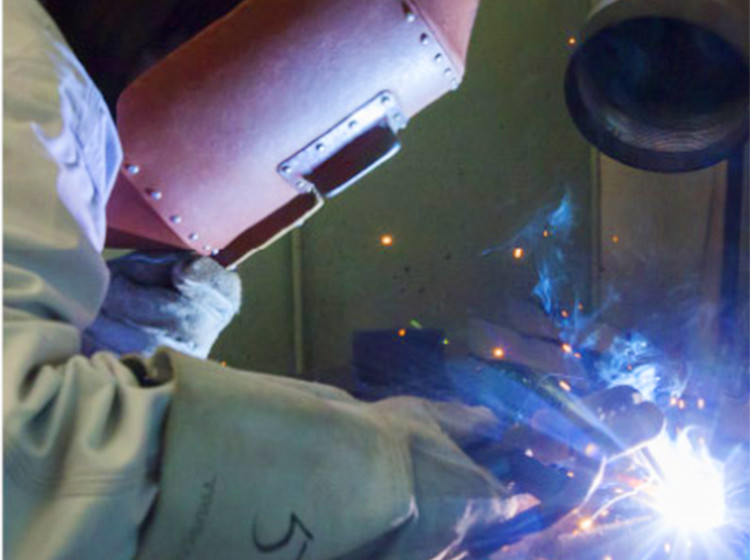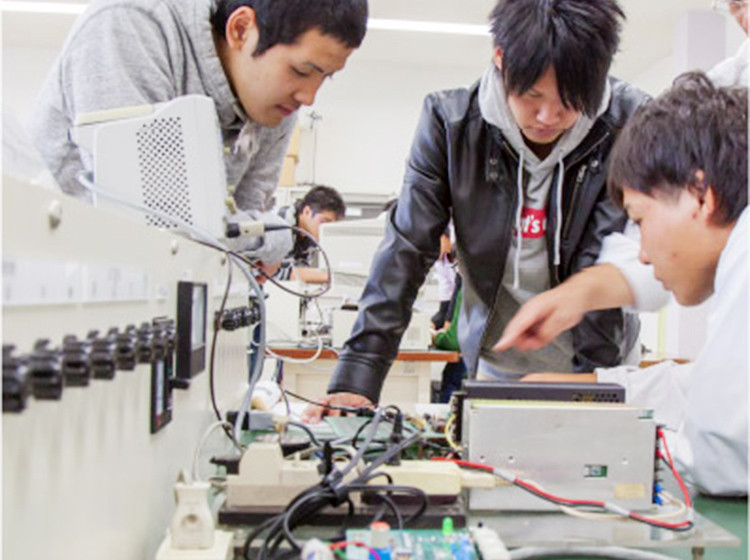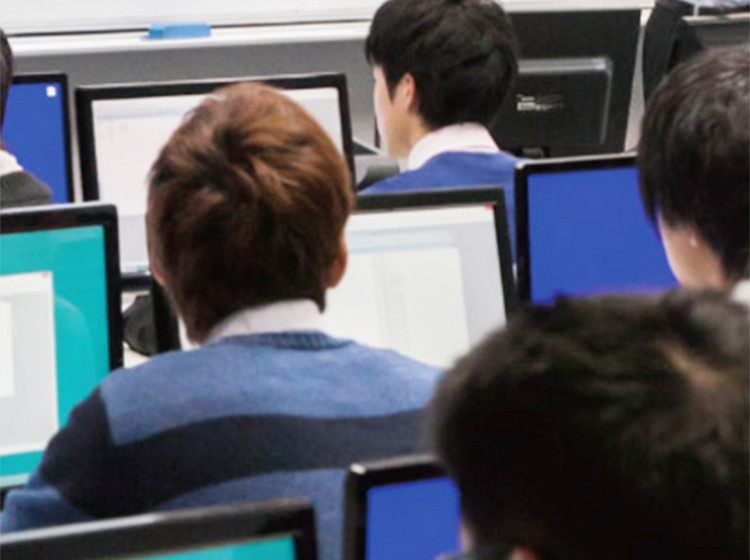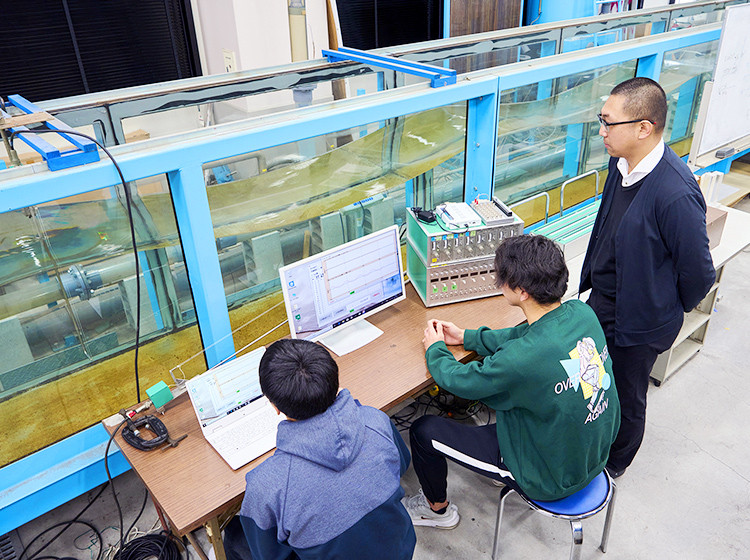Faculty of Engineering
Faculty of Engineering
There is only one Integrated System Engineering Department at our Engineering School. A student can select one of 7 special fields provided at our school according to his purposes. The reason for this unique organizaion of the school is that our school brings up not only specialists who has mastered knowledge or technology of special fields, but also generalists who can understand engineering as a whole beyond their own special fields. This is because present-day manufacturing requires not only one spececial field but also wide-range and high-level knowledge and technology. Threfore, the original curriculum suitable for social needs is organized such as the organization of common subjects to engineering school, introductory education for the basic study of engineering, accreditation of other special subjects, etc.
Mechanical-Engineering
This is the mechanical course which provides future engineers with a wide range of fields such as mechanical design or manufacture, mechanical maintenance, etc. based on special knowledge or special skills necessary as mechanical engineers. Applied technologies, such as mechanical design and manufacture etc., are learned on the basis of 4 dynamics of "mechanics of materials", "mechanics", "hydrodynamics", and "thermodynamics." Moreover, students will also learn information processing technology such as "CAM" for the study of creating the processing data of an NC machine, "CAE" for the structural or strength analysis, including "CAD" for the creation of design data by a computer. Furthermore, it is the special feature that there are many practical lessons: learning the way of thinking or control methods of automatic control systems such as a robot or an airplane by "control engineering", experiencing the pleasure and sense of accomplishment of actual "manufacturing exercise" which performs welding, machining, and assembly by students themselves, etc. The support for the 3rd class of mechanical design engineer's and passing the 1st engineer's examinations is also performed at comprehensive exercise class I to III.
The "manufacturing exercise" which makes you experience the automatic lathe by "3D-CAD" or CAM performing 3-dimensional design by use of SolidWorks widely utilized by many manufacturers in actual business operation, and the exercises by use of high-level 3D-CAD and CATTA V5 used in the fields of cars and aviation are performed, thus enabling to develop manufacturing ability which becomes useful on the actual spot after employment. It is a style that experience study is performed first and afterwards basic theory is learned, and it is also a feature that technology can be acquired while enjoying yourself. Furthermore, a practical measure, such as performing the "manufacturing workshop" for supporting initiative ability, creative ability, planning ability, etc. and joint research with business enterprise., are also performed.
Based on special knowledge and skills required as a mechanical engineer, the skill about productive maintenance, preventive maintenance, breakdown maintenance, life prediction, etc., and aims at bringing up the apparatus maintenance engineers and production engineers of a plant, such as a manufacturing site of a machine and electric apparatus, steel, science, and a power plant. In a lesson, while studying the basic knowledge about a machine or electricity by "mechanism study", "mechanics", "reliability engineering", etc., practical knowledge and technology are firmly learned by many experiments, such as "a mechanical engineering experiment", "machining", and "welding", training, etc. Moreover, while preparing graduation research in long-term internship or an enterprise, acquisition-of-qualification support is also strengthened further. One who can be an effective worker immediately whom an enterprise asks for is brought up. Of course, completion of the main subjects of each course of Integrated System Engineering Department is also possible. Various knowledge and technology can be studied according to each student's interest and future target.
Electric-Information-Engineering
It is the feature of the electrical and electronic course that the way to the teacher of a senior high school (mathematics, engineering, and information) or a junior high school (mathematics) is also opened, to say nothing of the ability to play an active part in the front of the industry concerned as a practical electrical and electronic engineer who has acquired IT technology. Importance is placed on the meausure of qualification acquisition such as opening "Practical Electrical Engineering I to IV" in the first year for the purpose of qualification acquisition of Class 1 or Class 2 licensed electrician and Class 3 licensed chief electrician, and as a result we are proud that the successful applicants ratio of Class 1 and Class 2 licensed electricians exceeds more than 90% every year. There are various experimental devices related to electrical and electronic engineering within the campus: the experimental device for experiencing the manufacturing process of semiconductors which constitute ICs (integrated circuit) becoming the nucleus of digital products, a high-voltage experimental device which simulates thunderstorm strike on an airplane at the altitude of 1,000m, electric vehicles, electric motorcycles, omnidirectional mobile robots, small-scale hydropower machines, etc. It is useful for students to understand high-level technology experimentally.
Based upon electrical and electric engineering and their fusion, brings up engineers who can utilize knowledge such as control, measurement, information, mechatronics, and robotics. Furthermore, the course also brings up researchers who can use high-level computer control system represented by artifificial intelligence for the development of robots with high autonomous function or automobiles with high safety. Students have an opportunity to understand the mechanism of mechanical control by "mechatronics" and "robotics", and the control mechanism which replaces the portion of consciousness by computer image processing with "control system engineering", "electronic circuits", "programming".
We develop practical information engineers with a wide range of computer knowledge. Therefore, both software and hardware are thoroughly learned from the first year. The lessons place an emphasis on practical knowledge such as "logical design" and "computer engineering" to get important hardware knowledge, "integrated circuits" to learn elemental technology and basic circuits in integrated circuits, "multimedia engineering" indispensable to know the present-day information systems etc. as well as "programming." Furthermore, by organizing the curriculum that incorporates many experiments or exercises, exercise subjects, clear understanding is urged and application ability is raised. After graduation they can play an active part in the front of the industry concerned as engineers of hardware development or computer maintenance, systems engineers, or programmers. The way to teachers of a senior high school (mathematics, engineering, and information) and a junior high school (mathematics) is also opened.

